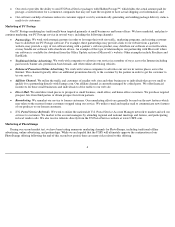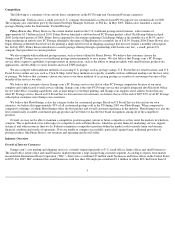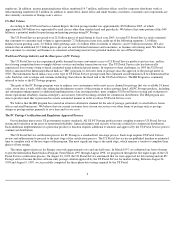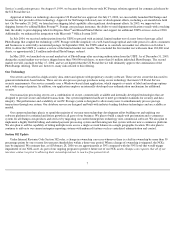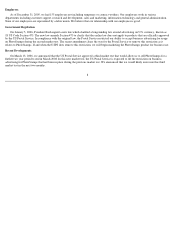Stamps.com 2005 Annual Report Download - page 17
Download and view the complete annual report
Please find page 17 of the 2005 Stamps.com annual report below. You can navigate through the pages in the report by either clicking on the pages listed below, or by using the keyword search tool below to find specific information within the annual report.
Accounting Principles Board Opinion (“APB”) No. 25, “Accounting for Stock Issued to Employees”,
with a pro forma disclosure of the impact
on net income (loss) of using the fair value option expense recognition method. Prior to our adoption of SFAS No. 123 (revised 2004), “Share
Based Payment,”
or Statement 123(R), on January 1, 2006, we had elected to apply APB No.25 and accordingly we generally did not recognize
any expense with respect to employee options to acquire our common stock in periods ended on or prior to December 31, 2005 as long as such
options were granted at exercise prices equal to the fair value of our common stock on the date of grant.
In December 2004, the Financial Accounting Standards Board (“FASB”) issued Statement 123(R). Statement 123(R) requires that the
compensation cost relating to share-based payment transactions be recognized in financial statements. This cost will be measured based on the
fair value of the equity instruments issued. We adopted Statement 123(R) on January 1, 2006, which is the first day of our 2006 fiscal year. We
expect the adoption of Statement 123(R) to have an adverse effect on our operating results, as we continue to use options to attract, incentivize
and retain our employees.
The tax value of our net operating losses could be impaired if we trigger a change of control pursuant to Section 382 of the Internal
Revenue Code.
Under the complicated rules of IRC Section 382, a change in ownership can occur whenever there is a shift in ownership by more than
50% by one or more five-percent shareholders within a three-year period. If a change of ownership is triggered, our NOLs may be impaired,
which could harm stockholder value.
Our charter documents could deter a takeover effort, which could inhibit your ability to receive an acquisition premium for your shares.
The provisions of our certificate of incorporation, bylaws and Delaware law could make it difficult for a third party to acquire us, even if it
would be beneficial to our stockholders. In addition, we are subject to the provisions of Section 203 of the Delaware General Corporation Law,
which could prohibit or delay a merger or other takeover of our Company, and discourage attempts to acquire us.
The US Postal Service may object to a change of control of our common stock.
The US Postal Service may raise national security or similar concerns to prevent foreign persons from acquiring significant ownership of
our common stock or of Stamps.com. The US Postal Service also has regulations regarding the change of control of approved PC Postage
providers. These concerns may prohibit or delay a merger or other takeover of our Company. Our competitors may also seek to have the US
Postal Service block the acquisition by a foreign person of our common stock or our Company in order to prevent the combined company from
becoming a more effective competitor in the market for PC Postage.
Our stock price is volatile.
The price at which our common stock has traded since our initial public offering in June 1999 has fluctuated significantly. The price may
continue to be volatile due to a number of factors, including the following, some of which are beyond our control:
• variations in our operating results,
• variations between our actual operating results and the expectations of securities analysts,
• investors and the financial community,
• announcements of developments affecting our business, systems or expansion plans by us or others,
• and market volatility in general.
As a result of these and other factors, investors in our common stock may not be able to resell their shares at or above their original
purchase price. In the past, securities class action litigation often has been instituted against companies following periods of volatility in the
market price of their securities. This type of litigation, if directed at us, could result in substantial costs and a diversion of management’s
attention and resources.
14


